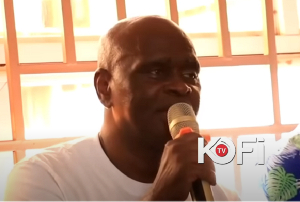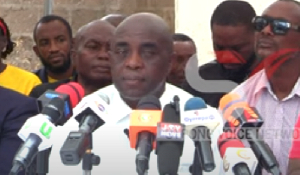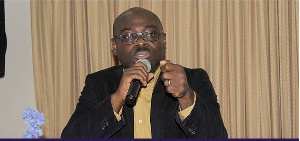Opinions of Wednesday, 4 January 2012
Columnist: Kufuor, Appiah Danquah
Christmas At Ashiaman And My Tears For Our Nation.
For the past 28 years, I have had the privilege of spending Christmas with my mother, family, friends and church members at my quiet, comfortable small space that the Good Lord has provided for us in Romiley (Cheshire- United Kingdom). Like all residents in this part of the world, the Christmas festivity provides us with the opportunity to enjoy the “western material world” to the full. Every worldly desire is taken care of including basic social infrastructure like running water and electricity.
This year, we decided to spend Christmas at Ashiaman a shanty town near Tema with new found friends. For readers who may not be familiar with Ashiaman, the mere mention of this shanty town sends shivers on the spine of some “middle-class” Ghanaians. The perception of this sprawling, poor, underprivileged suburb by the majority of Ghanaians is a place of lawlessness and criminality.
Location
Ashiaman itself is located about 4km to the North of Tema and about 30km from Accra the capital city of Ghana. It has an estimated population of over 300,000 with an average household of more than 6. The true population figure may be nearer the 400,000 mark. There is no need to bore readers with the socio-economic statistics of the area just to mention that: it has only one public health centre, one private maternity home and 14 “so-called” private clinics. There are less than 30 public toilets for the whole populace and most houses have no indoor toilets.
One may ask why choose Ashiaman of all places to spend Christmas? The answer is simple: The Lord Jesus Christ (friend of the powerless, destitute and wretched) in whose name we celebrate Christmas would have chosen Ashiaman above Leafy and prosperous Cheshire to relax over his birthday. Moreover, our company have invested in shops, a guest house, 2 micro finance institutions and the vitality, energy, friendliness of the place is infectious
Street Party-24th December 2011
On the night of 24th December 2011, we decided to have a bash in Zenu. Together with the children, we danced; drank homemade brew; shared our little food; and let our hairs down. My little boy danced till he dropped – truly it was one of the best Christmas Eve parties that I had ever attended. Of course our feet were dirty with dust, our bellies were filled with cheap and dodgy stuff but our hearts was filled with joy.
Christmas Day-25th December 2011
I woke up early on 25th December at Zenu, feeling a bit over the top to be greeted with the Electricity Corporation of Ghana (ECG) swansong. Thankfully the “concert” of ECG lasted for only 2 hours enabling us to attend church service. After church service we had a communal meal with friends and local folks followed by music, dancing and merry making. The merry- making was literally brought to a halt when we heard shouts of “thief, thief, thief”. Obviously, we all rush to the scene to be met with a sight that will remain forever with me till my dying day- a tired, hungry, 6 year old child accused of stealing an old worn out bicycle by grown up adults. The adults were ready to beat the hell of this poor child as in this part of the world mercy is in the hands of the gods. With the intervention of some opinion leaders and elders of the community this poor child was set free and I was given the task to drag him to his parents for some Ghanaian hard talk. Whilst walking this poor child (let us call him “Kofi” for the purpose of this article) I thought of the opinion rendered by Judge Jed Rakoff in the matter of the Securities and Exchange Commission(SEC) and Citigroup on November 28th 2011 at US Federal Courthouse in Foley Square. Readers may ask what is the connection between a poor wretched 6 year old in Ashiaman and a whopping $285million settlement between the most powerful regulatory body in the world SEC and a prestigious Wall Street Investment Group?
Relevance of Judge Jed Rakoff Opinion
You may be right – the young lad’s miserable existence bears no resemblance, and is non-comparable to the lifestyle of children of Citigroup executives or the children of New York. However, court judgements have no national boundaries. The bold opinion of Judge Jed Rakoff in this particular case is of relevance to our country and the economic fortunes of some of our miserable young people. For so long, the issue of governance in sub- Sahara Africa have been left to an African educated elite whose main function is to bamboozle the majority of the populace with jargons and big “technical language”. No one dares question our learned Judges; or so- called educated ones. For example, in the Alfred Agbesi Woyome case no one has questioned the role of the Judge who rubber-stamped this deal.
Commentators, experts, serial callers, television and radio panellists have all hidden behind the so called “11th Commandment- Consent Judgement” to exonerate the honourable Judge who rubber stamped the payment of this huge sums of money.
What is Consent Judgement?
In order for our mothers and aunties to be able to follow my line of thinking, I will just give a brief explanation of what a consent judgement means. For so long, some of us miserable, unschooled, unemployed African souls have suffered from the “book-longish” of our elites.
Consent judgement?
Consent Judgment is a judgment issued by a Judge based on an agreement between the parties to a lawsuit to settle the matter aimed at ending the litigation with a judgment that is enforceable. For the Judge to issue a consent judgment all parties must indicate that the agreement has been mutually agreed and that they find it acceptable
Case before Judge Jed Rakoff- S.E.C. v Citigroup
Before our book-long people try to bamboozle us again with “I put it to you etc”, folks the summary of the case before Judge Rakoff was very similar to the one brought before our learned Judges in Ghana in the Woyome case. The Securities and Exchange Commission possibly the most powerful regulatory body in the world had agreed a $285 million settlement with Citigroup. Instead of pursuing the group to trial for “alleged” wrongdoing. The SEC’s director of enforcement, Robert Khuzami, says pursuing a trial instead of settling “would divert resources away from the investigation of other frauds”.
Opinion of Judge Jed Rakoff
In a blunt court order, Judge Rakoff broke with decades of judicial deference to the SEC and suggested that regulators were enabling Wall Street’s efforts to hide allegedly “knowing and fraudulent” acts from the public. He went on further to state:
“The injunctive power of the judiciary is not a free roving remedy to be invoked at the whim of a regulatory agency, even with the consent of the regulated. If its deployment does not rest on facts-cold, hard solid facts, established by admission- it serves no lawful or moral purpose and is simply an engine of oppression”
Not mincing his words the Judge further reminded the powerful SEC that: “The court cannot somehow approve this problematic consent judgement. In the end the court concludes that it cannot approve it, because the court has not been provided with any proven or admitted facts upon which to exercise even a modest degree of independent judgement”
Judge Rakoff conclusion remarks were equally blistering:
The court is forced to conclude that a proposed Court Judgement that ask the court to impose substantial injunctive relief, enforced by the court’s own contempt power, on the basis of allegations unsupported by any proven or acknowledged facts whatsoever is neither reasonable, nor fair , nor adequate nor in the public interest
Readers, please note the last line “public interest”. The Judge went on further to state:
It is not reasonable, because how can it ever be reasonable to impose substantial relief on the basis of mere allegation? It is not fair, because despite Citigroup’s nominal consent, the potential for abuse in imposing penalties on the basis of facts that are neither proven nor acknowledged patent. It is not adequate, because, in the absence of any facts, the court lacks a framework for determining adequacy. And most obviously, the proposed Court Judgement does not serve the public interest, because it asks the court to employ its power and assert its authority when it does not know the facts” Once again, I implore readers to note the Judge’s continual use of the key phrase public interest.
Tears for our Nation
Back to downtown Ashiaman - What happened to Kofi? Well we arrived at the “home” of his parents, a ramshackle uncompleted hut with no running water, electricity, bed or a proper window. The mum was visibly ill and all that they had to eat on Christmas day was a bowl of porridge.
In a weak and slurred voice the mum said she was sorry but her boy had dreams of owning a bicycle. At that stage, my tears were already on my lips. Real and genuine tears for my beloved country. Of course, we all chipped in to provide Kofi with a second hand bicycle costing around $10. As I sat at my warm home in Cheshire drinking coffee and biscuits and writing this piece I am haunted by the terror on the face of “Kofi” a child forced to steal a bicycle for Christmas.
I have asked myself more than a hundred times “Why do we morally compromise at the expense of the powerless”? In his new impeccably documented work and memoir “All the Missing Souls,” David Scheffer opens up diaries and despatches from within the halls of power linking failure by policy makers and world leaders to act to prevent atrocities.
On Rwanda, Mr Scheffer writes “For those of us in the policy rooms at the time, the memory of our vacillation over the horror is sickening and will never be extinguished”. He continues “I owe the victims and their families my soul every day”.
In our case it may be that our actions and inactions may deprive a child a bowl of porridge, a torn shirt over his back, a tattered school sandals or bag and in the case of “Kofi” a second hand bicycle. I hope and pray that our institutions tasked with the role of ensuring probity, accountability, transparency, and fairness would rise up to the challenge and stop passing the buck.
Maybe if the Learned Judge in the case of Mr Agbesi had not passed the buck some of the cash would have been used to improve the lives of little “Kofi” from Ashiaman. Judge Rakoff had no one to pass the buck; he did his job- acted in the interest of the ordinary American.
God Bless
Appiah-Danquah Kufuor
Entertainment











